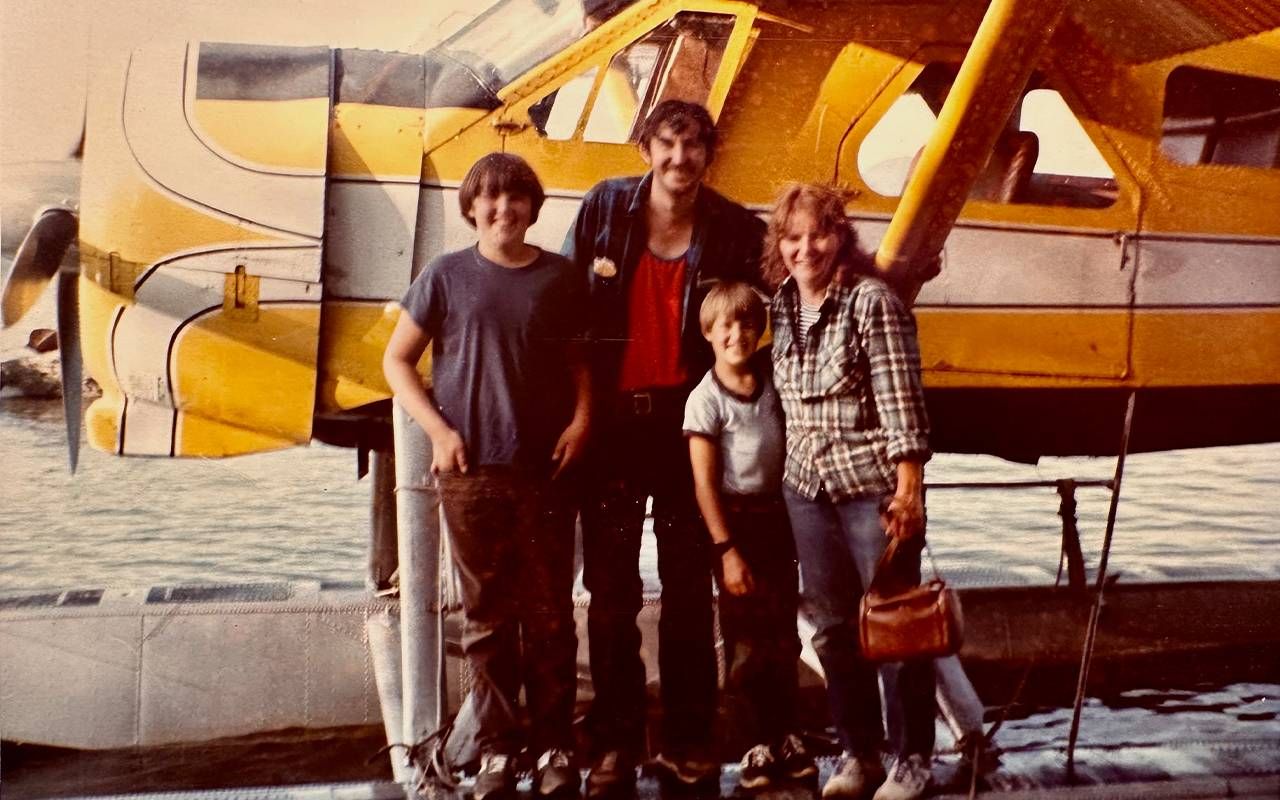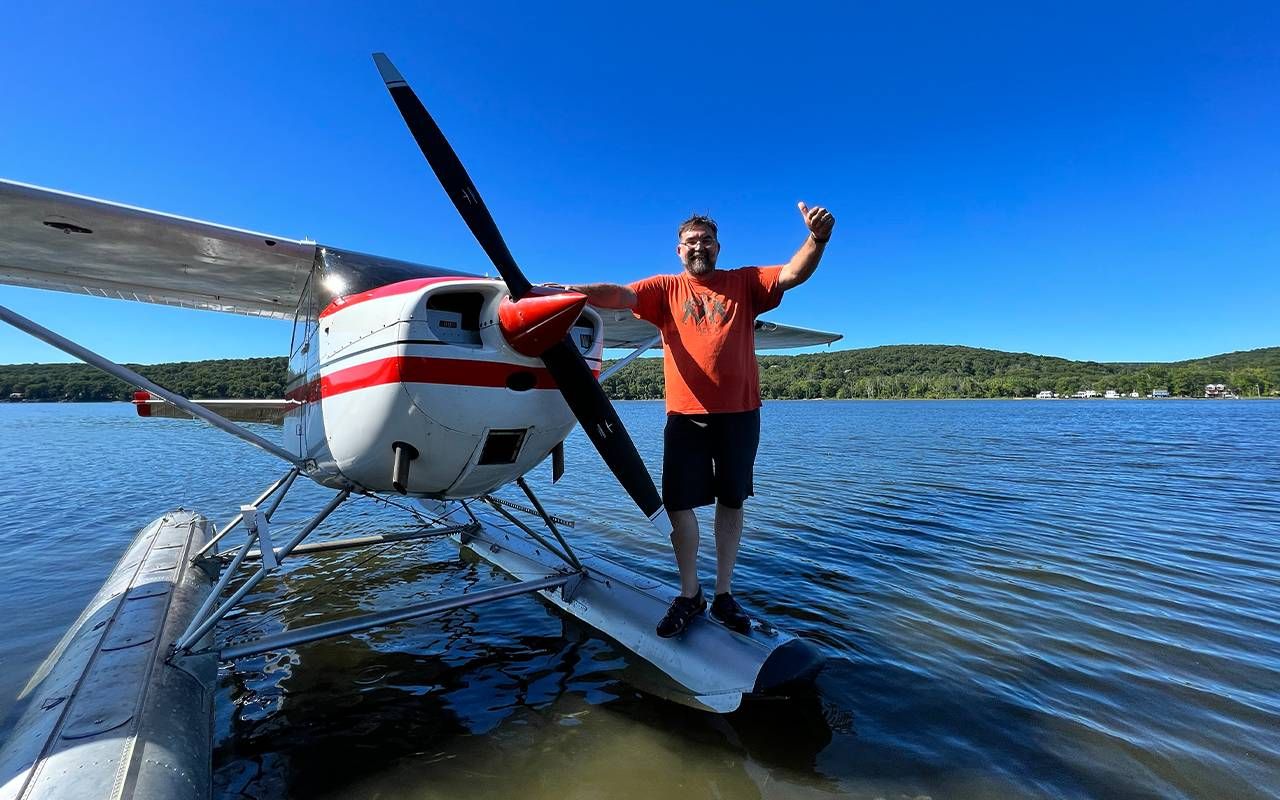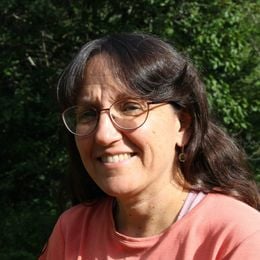Dreaming of a New Career? The Sky’s the Limit
Life got in the way of his longing to be a professional pilot when he was young, but nothing stopped him in his 50s
When my husband, D.J., was 13 years old, his father announced that during their camping trip in Maine that summer, they would fly over Moosehead Lake in a seaplane for a sightseeing tour of the surrounding wilderness. Everyone thought this would be great fun. Everyone, that is, except D.J.

"I was terrified," he recalls, "I did not want to go. I was 13. My brother was 8. He kept talking about how fun it would be. My mother tried to console me and said that it would be fun, and there was nothing to be scared about."
"There wasn't a day since that summer in 1983 that I didn't look up and wish I was up in the clouds."
After further consolation from his mother, he relented and boarded the plane with his family. As soon as they rose from the water, his fear flew away. He was mesmerized.
A Pilot Is Born
"There was a freeing sensation and everything got smaller as we climbed higher and higher," he recalls fondly. "It was so much fun. Ironically, my brother got air sick. He couldn't wait to get back down. I did not want to come back down. This one event would change my life forever."
Thus began D.J.'s passion for aviation. He still gets starry-eyed when he talks about that season of the seaplane. "There wasn't a day since that summer in 1983 that I didn't look up and wish I was up in the clouds," he recalls wistfully. "I wanted to become a pilot! Specifically, a seaplane bush pilot."
When D.J. was 17 years old, his father co-signed a loan to pay for flying lessons for his older son, and the boy's dream took flight. In July 1988, D.J. commenced flying with a flight instructor twice a week and in December he soloed for the first time.
Life Gets in the Way
D.J.'s training, however, took a hiatus. He first went to work with his father as a carpenter, then attended college and after graduating he went on to pursue various careers.
"Flying a plane is not easy," he explains. "There were some struggles along the way. I stopped my flight training in October 1989. There were a few reasons. On one of my solo cross-country flights (from Connecticut), I got lost going to Albany, New York. There was no GPS back then. It scared me a bit.
"The other reason is I ran out of money," he adds. "I had all good intentions of starting again, but life, work and family put me on a different path for a while."
How many of us, as children, teens or young adults, dreamed we would have a certain career once we grew up? If we enjoyed a restaurant, we wanted to be a chef. After having a successful stretch at school, we wanted to be a teacher. If we took a field trip to an aquarium, we wanted to be a marine biologist.
Deferred but Not Denied
What happened to those dreams? We say something like, "Life got in the way." Yes, life happens. Raising a family takes time, love and sacrifice. Our jobs take time, commitment and sometimes all the energy we can muster. Hope dims as reality sets in.
But maybe — when the time is right — we can awaken those dormant dreams. Rekindle some of that passion that got ignited the first time we lifted off the lake in a seaplane, shoved off from shore in a sailboat or saw someone's grin as we handed them a fresh doughnut we'd baked ourselves. We can take care of our responsibilities while also allowing space for joy.

D.J. did return to flying. "After the events of 9/11, I joined the Navy Reserves in April of 2003," he recounts. "The country was still reeling from that fateful day and we were just beginning the war on terror. I wanted to serve my country and do what I could to help keep my family and friends safe from terrorism.
Prodded by Naval Aviators
"I trained as an intelligence specialist and was stationed for a time with VFA-204, a composite squadron made up of reservists and active-duty members called the 'River Rattlers' in Belle Chasse, Louisiana," D.J. adds. "I befriended several of the pilots, and they asked me if I ever flew a plane. I told them about my training between 1988–1989. They said if I still had my logbook that those training hours still counted, and I should look into finishing my private pilot license."
"I am blessed to be a pilot . . . What a cool and miraculous thing it is!"
"I thought it a bit crazy," he remembers, "but that evening I called my mom and asked if she still had all my old flight stuff stored away in the attic. She did!"
A few months later, in September 2006, D.J. nervously walked into a small office at Robertson Airport in Plainville, Connecticut, and restarted his flying journey. In March 2007, he passed his Private Pilot Flight Exam and officially became a pilot.
Since then, there have been times when D.J.'s flying aspirations had to take a back seat to family obligations or job responsibilities or a global pandemic. Today he teaches high school science and aerospace engineering.
He also flies regularly, and counts it a blessing to be able to live out the dream and recapture the joy that began that day over Moosehead Lake.
"I am blessed to be a pilot," he says. "I woke up this morning and looked out at the trees swaying in some pretty stiff wind. I knew I wouldn't be flying today, but it got me thinking about the blessings of even having the choice. What a cool and miraculous thing it is!"
Can we recall a time in our lives when we did something that made us truly happy? Maybe it's time to dig the logbook out of the attic. Take an intro flight. Spend a day shadowing someone who is doing that job you've always wanted to try.
Or just dive right in. Take a dance class. Enter an art contest. Pitch an article. The sky's the limit!
If the Blue Yonder Beckons
Here are a few links to get you started on your own journey:
Where to start
If you are interested in flying but, like most of us, do not own your own plane, consider joining a flying club. Some offer access to club planes; they all offer camaraderie and a chance to learn from one another. The Aircraft Owners and Pilots Association (AOPA) can help find flying clubs near you.
Service Opportunities
The Civil Air Patrol (CAP), an auxiliary branch of the U.S. Air Force, offers training, access to newer planes and myriad volunteer opportunities, such as participating in humanitarian efforts, homeland security and making cadet-orientation flights.
Patient Airlift Services and Angel Flight America need pilots to fly people in need of medical attention.
More information on airline pilot careers may be found on these websites:


